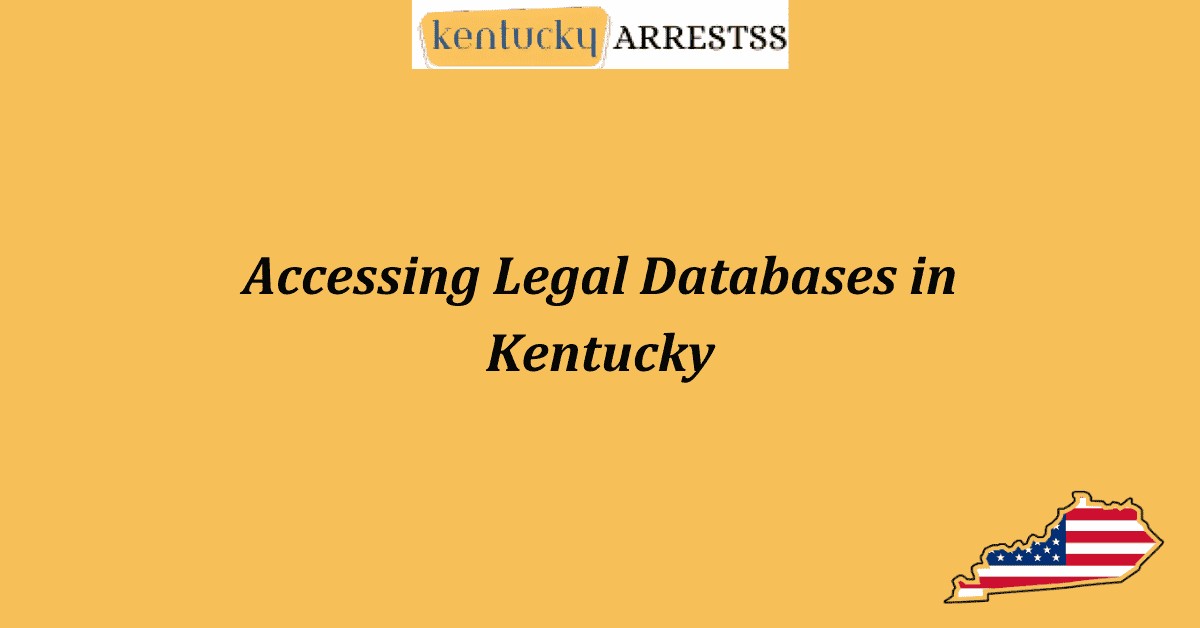Accessing Legal Databases in Kentucky
Legal professionals and individuals seeking information in Kentucky often find themselves in need of accessing legal databases. These databases serve as valuable repositories of legal documents, cases, statutes, and regulations specific to the state. By utilizing these databases, users can efficiently retrieve relevant information to support their legal research and cases. Whether you’re a lawyer, student, or individual looking for legal guidance, accessing legal databases in Kentucky is essential for staying informed and up-to-date on the latest legal developments.
With the vast amount of legal information available online, navigating through legal databases in Kentucky can be a daunting task. However, with the right approach and understanding of how to effectively utilize these resources, users can access a wealth of valuable information. From case law to legislative updates, legal databases in Kentucky offer a comprehensive platform for legal research and analysis. By familiarizing yourself with these databases and their functionalities, you can enhance your legal knowledge and make informed decisions in your legal endeavors.
Benefits of Accessing Legal Databases in Kentucky
Legal professionals and researchers in Kentucky can greatly benefit from accessing legal databases that provide a wealth of information and resources. These databases offer a wide range of advantages that can enhance legal knowledge, support efficient legal research, and keep individuals informed on the latest legal developments.
Stay Informed on Latest Legal Developments
One of the primary benefits of accessing legal databases in Kentucky is the ability to stay informed on the latest legal developments. By having access to up-to-date information on statutes, case law, and regulations, legal professionals can ensure they are aware of any changes or updates that may impact their work.
Access to Statutes, Case Law, and Regulations
Legal databases provide a centralized location for accessing statutes, case law, and regulations relevant to Kentucky law. This comprehensive access allows users to efficiently search for specific information, compare different sources, and ensure they have the most accurate and reliable data for their research or cases.
Conduct Efficient Legal Research
Legal databases offer powerful search tools and features that enable users to conduct efficient and effective legal research. By utilizing these tools, legal professionals can save time, streamline their research process, and access a wide range of resources that may not be readily available through other means.
Enhance Legal Knowledge and Expertise
Accessing legal databases in Kentucky can help legal professionals enhance their knowledge and expertise in specific areas of law. By exploring different sources, reading relevant cases, and analyzing legal trends, individuals can deepen their understanding of complex legal issues and improve their overall competency in their field.
Convenient and Centralized Access to Legal Information
Legal databases provide a convenient and centralized platform for accessing a vast amount of legal information in one place. This accessibility allows users to quickly find the information they need, access resources from multiple sources, and efficiently manage their research projects without having to search through numerous websites or physical documents.
Valuable Resource for Legal Professionals and Researchers
Legal databases serve as a valuable resource for legal professionals, researchers, and anyone in need of reliable legal information. Whether seeking background information on a specific legal topic, conducting in-depth research for a case, or staying updated on current legal issues, these databases offer a wealth of resources to support diverse legal needs.
Stay Up-to-Date on Kentucky Law Issues
By accessing legal databases in Kentucky, individuals can stay up-to-date on the latest law issues, trends, and developments that may affect their work or practice. This timely information is essential for making informed decisions, providing accurate advice to clients, and ensuring compliance with current legal requirements.
Essential Information for Legal Needs
Overall, accessing legal databases in Kentucky provides essential information and resources for fulfilling legal needs, conducting research, and staying informed on relevant legal matters. By utilizing these databases effectively, legal professionals and researchers can enhance their capabilities, improve their research outcomes, and stay ahead in their field.
Frequently Asked Questions
Our Frequently Asked Questions section provides detailed information to address common queries about accessing legal databases in Kentucky.
What legal databases are available in Kentucky?
In Kentucky, legal professionals and researchers have access to various legal databases, including Westlaw, LexisNexis, and Fastcase. These databases offer a wide range of legal resources, such as case law, statutes, regulations, and legal articles.
How can I access legal databases in Kentucky?
To access legal databases in Kentucky, individuals can typically subscribe to these services through their law firms, universities, or libraries. Some databases may also offer individual subscriptions for legal professionals and researchers.
What types of legal information can I find in Kentucky legal databases?
Kentucky legal databases provide a wealth of legal information, including court opinions, statutes, regulations, administrative decisions, legal forms, and secondary legal sources. Users can conduct comprehensive legal research and stay updated on the latest legal developments in the state.
Are there any free legal databases available in Kentucky?
While many legal databases in Kentucky require subscriptions or access fees, some resources offer free access to legal information. Websites like the Kentucky Court of Justice, Kentucky Legal Aid, and the Kentucky Legislature provide valuable legal resources at no cost.
How can I stay informed about updates and changes to Kentucky legal databases?
Legal professionals and researchers can stay informed about updates and changes to Kentucky legal databases by subscribing to email alerts, following database providers on social media, attending legal research training sessions, and regularly checking the databases for new content and features.
Can I access legal databases on mobile devices in Kentucky?
Many legal databases in Kentucky offer mobile applications or responsive websites that allow users to access legal information on their smartphones and tablets. By downloading the relevant apps or visiting the websites on mobile browsers, legal professionals can conduct legal research on the go.






